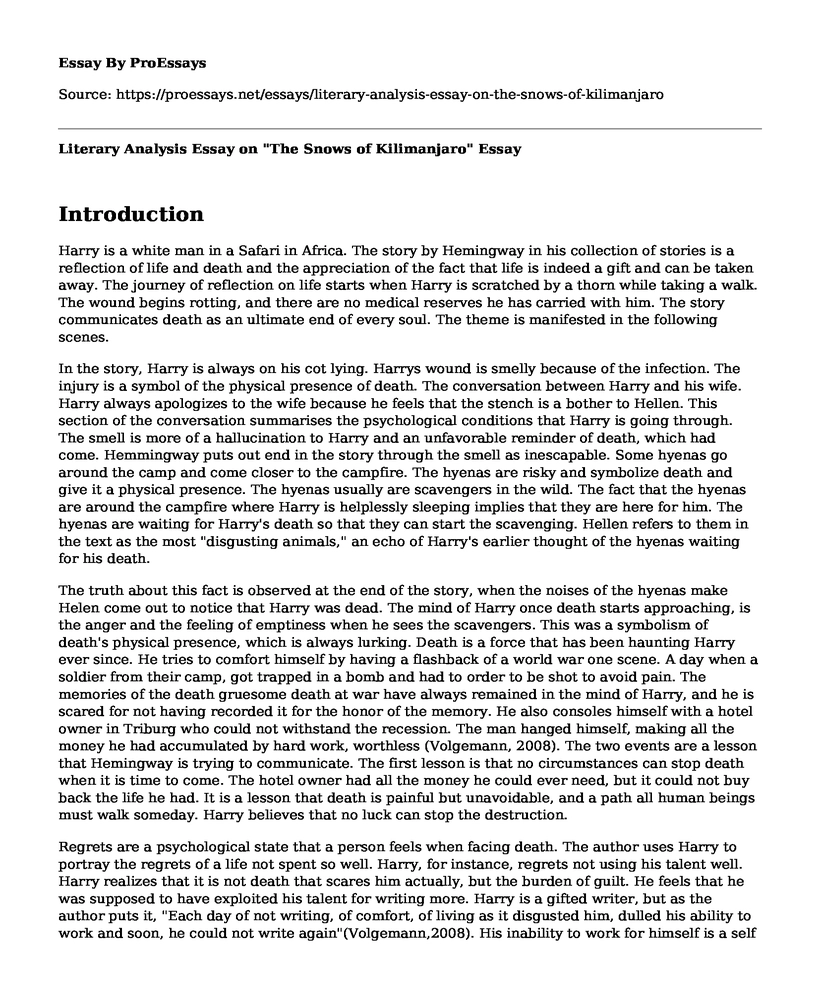Introduction
Harry is a white man in a Safari in Africa. The story by Hemingway in his collection of stories is a reflection of life and death and the appreciation of the fact that life is indeed a gift and can be taken away. The journey of reflection on life starts when Harry is scratched by a thorn while taking a walk. The wound begins rotting, and there are no medical reserves he has carried with him. The story communicates death as an ultimate end of every soul. The theme is manifested in the following scenes.
In the story, Harry is always on his cot lying. Harrys wound is smelly because of the infection. The injury is a symbol of the physical presence of death. The conversation between Harry and his wife. Harry always apologizes to the wife because he feels that the stench is a bother to Hellen. This section of the conversation summarises the psychological conditions that Harry is going through. The smell is more of a hallucination to Harry and an unfavorable reminder of death, which had come. Hemmingway puts out end in the story through the smell as inescapable. Some hyenas go around the camp and come closer to the campfire. The hyenas are risky and symbolize death and give it a physical presence. The hyenas usually are scavengers in the wild. The fact that the hyenas are around the campfire where Harry is helplessly sleeping implies that they are here for him. The hyenas are waiting for Harry's death so that they can start the scavenging. Hellen refers to them in the text as the most "disgusting animals," an echo of Harry's earlier thought of the hyenas waiting for his death.
The truth about this fact is observed at the end of the story, when the noises of the hyenas make Helen come out to notice that Harry was dead. The mind of Harry once death starts approaching, is the anger and the feeling of emptiness when he sees the scavengers. This was a symbolism of death's physical presence, which is always lurking. Death is a force that has been haunting Harry ever since. He tries to comfort himself by having a flashback of a world war one scene. A day when a soldier from their camp, got trapped in a bomb and had to order to be shot to avoid pain. The memories of the death gruesome death at war have always remained in the mind of Harry, and he is scared for not having recorded it for the honor of the memory. He also consoles himself with a hotel owner in Triburg who could not withstand the recession. The man hanged himself, making all the money he had accumulated by hard work, worthless (Volgemann, 2008). The two events are a lesson that Hemingway is trying to communicate. The first lesson is that no circumstances can stop death when it is time to come. The hotel owner had all the money he could ever need, but it could not buy back the life he had. It is a lesson that death is painful but unavoidable, and a path all human beings must walk someday. Harry believes that no luck can stop the destruction.
Regrets are a psychological state that a person feels when facing death. The author uses Harry to portray the regrets of a life not spent so well. Harry, for instance, regrets not using his talent well. Harry realizes that it is not death that scares him actually, but the burden of guilt. He feels that he was supposed to have exploited his talent for writing more. Harry is a gifted writer, but as the author puts it, "Each day of not writing, of comfort, of living as it disgusted him, dulled his ability to work and soon, he could not write again"(Volgemann,2008). His inability to work for himself is a self -made decision, hence the bitterness. The language he uses against himself is a language of scorn hidden in frustration. It is a sign of pain and the heaviness of the burden. The entire process, deaths that he has experienced and his inability to work, is a warning by the author of a character who fails to make a lot out of his life. Harry's death is not the death of his own stories only, but also the story of people who ended their lives too in his presence. It is a betrayal of many people to live a selfish and a life of inactivity. Our lives are interconnected, and the only way of being useful to society is by exploiting the talents we have.
Conclusion
In conclusion, the short story in the collection is an educative piece on the importance of always striving towards the goals of life. It encourages, exploring any given opportunity because death is inevitable and can come upon anybody without warning. The author suggests through Harry that at the face of death, regrets become more painful than the process of death itself. The memory of a past not written and the people betrayed by failure to utilize the talent leads to an end full of sorrows.
Reference
Vogelmann, J. (2008). Autobiographical Elements in" The Snows of Kilimanjaro" by E. Hemmingway. GRIN Verlag.
Cite this page
Literary Analysis Essay on "The Snows of Kilimanjaro". (2023, Feb 24). Retrieved from https://proessays.net/essays/literary-analysis-essay-on-the-snows-of-kilimanjaro
If you are the original author of this essay and no longer wish to have it published on the ProEssays website, please click below to request its removal:
- Ars Poetica by Archibald MacLeish - Critical Thinking Example
- Paper Example on The Epic of Gilgamesh
- The Iliad and the Archaic Greeks - Essay Sample
- Commentary of I Wandered Lonely as a Cloud Essay
- Critical Essay on Othello: A Tragedy of Jealousy and Gullibility
- Excerpts From Paradise Lost Analysis Paper Example
- Paper Example on The Iliad and Odyssey: A Tale of Latecomers From the East







